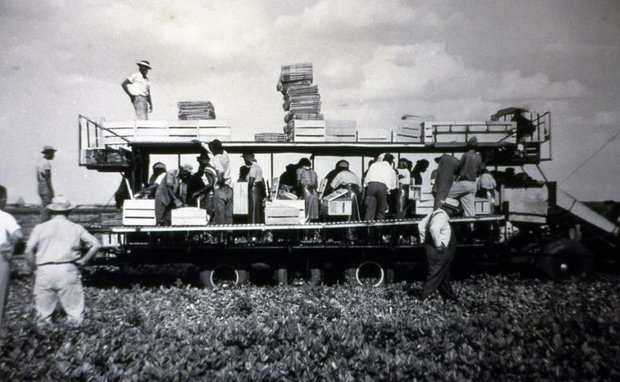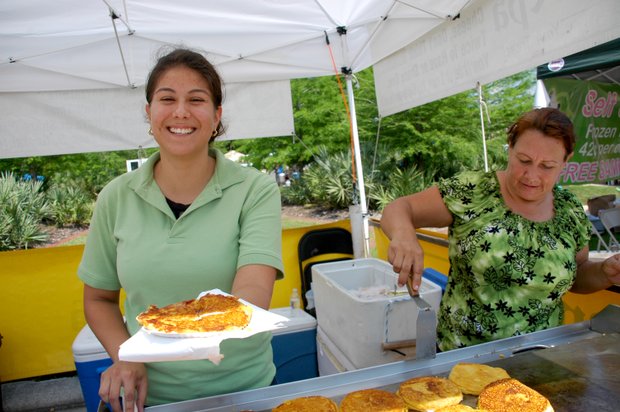An unlikely sounding combination, but that's agriculture for you.
My paternal grandfather was a railroad man. Used to tell stories about hauling train loads of Duda & Sons celery out of South Florida.
http://www.seminolevoice.com/news/2012/apr/04/celery-brate-history/
130 years of Citrus and Celery
 April 4, 2012
April 4, 2012
The celery industry helped found Oviedo, starting nearly 50 years before the town was incorporated.
By Allison Olcsvay
April 4, 2012 6:39 p.m.
Oviedo will once again showcase its unique agricultural heritage with the 18th annual Citrus & Celery Cook-Off.
The contest is part of the Taste of Oviedo, held at the Oviedo Mall on Saturday, April 14.
Amateur chefs will enter their best recipes in either the citrus or celery division with the only rule being that the dish must somehow feature their chosen produce item. Points are scored for originality, presentation and of course, taste.
Were here to have a good time and let people know that without citrus and celery, Oviedo would not be the city it is today, Cook-Off chairwoman Gloria Dunmire said.
Citrus started it, but celery put us on the map, she said.
Two panels of four celebrity judges, including Oviedo Mayor Dominic Persampiere, Oviedo-Winter Springs Regional Chamber of Commerce President Paul Sladek, two chefs and two teachers of the year will judge dishes in each division. Their combined scores will comprise 80 percent of the total awarded.
The remaining 20 percent of the final score will come from the community voters. Fifty festival-goers who make a $3 or more donation will have the privilege of sampling the recipes and voting for their favorites in each category. Here are the winning recipes from last year.
 April 4, 2012
April 4, 2012
Photo by Isaac Babcock
The Taste of Oviedo is coming to the Oviedo Mall April 14.
As a three-time entrant himself, judge Sladek has experience trying to come up with a clever idea for the contest.
A piece of advice to this years cooks: Dont try celery donuts, Sladek said. I thought they would be a great idea a few years ago, but it ended up being a big flop.
The grand-prize winner (the best of both categories) will take home a $325 cash prize. Other winners will receive gift cards or gift baskets from local vendors.
People of all ages will compete for top honors, including the youngest contestant, Logan Gay, who will turn 8 on the day of the cook-off.
Logan likes to help cook with the family, said his dad, George Gay. We hang out together in the kitchen, and he helps me with whatever I am making.
Hes a great kid and a great big brother, I couldnt ask for a better son.
Besides hanging out with his dad in the kitchen, Logan also likes archery and fishing.
He got the idea to enter the cook-off from his mom, Damaris Claude, whose Lemon Guava Cheesecake entry from a few years ago is still a family favorite.
Its like heaven in your mouth, Gay said. We make it every year now for Christmas.
With a little help from his mom, Logan has a recipe all picked out for this year, and with fingers crossed, he hopes he will have more than just a birthday to celebrate come April 14.
A history of citrus and celery in Oviedo
Small towns love their claims to fame. In Florida its no exception. Plant City has its strawberries, Zellwood has its sweet corn, and for Oviedo, it is citrus and celery.
A quirky combination to be sure, but together this duo has seen the city through good times and bad.
While not as romantic sounding as the strawberry fields of Plant City, these staple crops of citrus and celery have helped to develop Oviedo into the city it is today.
In fact, both crops were grown locally before Oviedo was officially named.
According to a history outlined by The Oviedo Preservation Project, the humble celery stalk was introduced to Florida in 1869, and citrus groves began to appear in the Oviedo area shortly thereafter, around 1870.
Andrew Aulin, the towns first postmaster, bestowed the growing little hamlet with the name Oviedo in 1879, after a city in Spain by the same name.
Oviedo was a successful little citrus town like others in Central Florida, producing a steady annual harvest until the freeze of 1895, which destroyed most of the states crop as the fruit hung ripe on the trees.
Ever resilient, Oviedo farmers quickly turned their loss into gain by the next year planting celery in the rich swampland around Lake Jesup.
It wasnt easy work though.
Growing celery was labor intensive, requiring complex irrigation and soil preparation. The fragile plants had to be covered and uncovered throughout their development to protect them from frost and too much sunlight.
Sometimes their work stunk, quite literally.
The stench of rotten eggs would permeate the air on a warm day rising in the heat from the rich mucky soil that made the area so fertile.
Growers quickly mastered the conditions and the complex farming methods and by the late 1920s, companies like A. Duda & Sons were shipping out celery by the trainload, helping to produce almost a third of the nations supply of the crunchy vegetable.
By WWII, the celery industry was thriving and so was Oviedo, producing enough to send overseas to support the war effort. Citrus had also seen a resurgence, and both industries helped deliver the city into the modern era.





